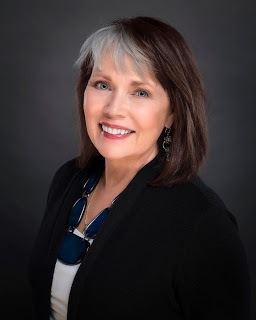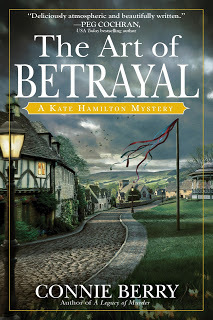Interview with Mystery Author Connie Berry

Connie Berry is the author of the Kate Hamilton Mysteries, set in the UK and featuring an American antiques dealer with a gift for solving crimes. Like her protagonist, Connie was raised by antiques dealers who instilled in her a passion for history, fine art, and travel. During college she studied at the University of Freiburg in Germany and St. Clare's College, Oxford, where she fell under the spell of the British Isles. In 2019 Connie won the IPPY Gold Medal for Mystery and was a finalist for the Agatha Award’s Best Debut. She’s a member of Mystery Writers of America and is on the board of the Guppies and her local Sisters in Crime chapter. Besides reading and writing mysteries, Connie loves history, foreign travel, cute animals, and all things British. She lives in Ohio with her husband and adorable Shih Tzu, Emmie. You can learn more about Connie and her writing at her website www.connieberry.com.
Link to book:
Amazon: The Art of Betrayal: A Kate Hamilton Mystery: Berry, Connie: 9781643855943: Amazon.com: Books
Indiebound: The Art of Betrayal: A Kate Hamilton Mystery | IndieBound.org
INTERVIEW:
Mayra Calvani: Please tell us about The Art of Betrayal and what compelled you to write it.
Connie: Hello, Mayra! Thank you for inviting me to chat about my books. When someone asks why I wrote The Art of Betrayal, I usually say (flippantly) to fulfill my contract obligations, which is true. But the real answer is because I’m interested in Kate and her circle of friends in the village of Long Barston. I love involving them in new and challenging circumstances so I can see how they react. Over time, characters change and develop. Hidden skills and flaws come to the surface. Their past histories return to cause problems. They must change and adapt. Right now I’m working on the next book in the series, and I’m already thinking ahead to what’s next for everyone. Change is a constant in both the real and fictional worlds. Nothing remains the same. People (and characters) must learn to deal with change or perish. How they do that is what interests me.
M.C.: What is your book about?
Connie: American antiques dealer Kate Hamilton is spending the month of May in the Suffolk village of Long Barston, tending her friend Ivor Tweedy’s antiquities shop while he recovers from hip surgery. She’s thrilled when a reclusive widow consigns an ancient Chinese jar—until the Chinese jar is stolen and a body turns up in the middle of the May Fair. With no insurance covering the loss, Tweedy may be ruined. As DI Tom Mallory searches for the victim’s missing daughter, Kate notices puzzling connections with a well-known local legend. This complex case pits Kate against the spring floods, the murky depths of Anglo-Saxon history, a house with a tragic history, and a clever killer with an old secret. It’s up to Kate to unravel a Celtic knot of lies and betrayal.
M.C.: What themes do you explore in The Art of Betrayal?
Connie: A major theme in all my writing is the effect of the past on the present. No one lives entirely in the present. Hidden below the surface are the people and the history that have shaped our lives and the world we live in. As an antiques dealer, Kate is used to living with the objects of the past. Her father once called her a divvy, an antiques whisperer. Sometimes she senses the emotional atmosphere in which an object existed, as if it had seeped into the cracks and crevices along with the dust and grime. That’s how the past clings to the present. They can’t be separated.
On the level of theme, Kate has been damaged by past losses and must learn to face them and move forward. England is a perfect place for her to do that work because in England, the past is only an inch deep. Strike the ground with a spade anywhere, and you’re bound to dig up history. In my current WIP, Kate reflects upon the foundations of a ruined tenth-century priory, recently discovered beneath a Waitrose parking lot.
Other themes I write about include love, courage, the nature of good and evil, deception, and friendship. What a book is really about usually becomes clear to me only after I’ve finished the first draft.
M.C.: Why do you write?
Connie: Like most authors, I’ve always been a writer. As a child I loved books, and I wrote and illustrated my own. Because my mom was a saver, I still have many of them, and interestingly, just about all of them revolve around some kind of mystery—though not a murder. I love creating stories. I love the “what if” question: “If this were to happen, how would my character respond? What would be the outcome?” I also love the power of language to communicate emotional truth without having to spell everything out. One of the skills writers develop over time is the ability to trust the reader to read between the lines.
M.C.: When do you feel the most creative?
Connie: I love the pre-writing phase, when all possibilities are open and literally anything could happen. What would make life harder for my protagonist? What would deepen the mystery? As the book begins to take shape in my mind, choices must be made to take the plot in one direction or another, but for me, those first weeks are the most creative.
M.C.: How picky are you with language?
Connie: On a scale of 1 to 10, I’m probably a 12. As I’ve already said, I love the power of language to communicate emotional truth. And I’ve always been in love with the rhythm and cadence of the English language. The words on the page should flow, carrying the reader along without jarring stops and starts. Unless you want them, of course. One of the characters might have poor communication skills. But even then, the language must communicate easily.
Language also has the power to make us laugh. When I was 12 or 13, I discovered in the stacks of my local library the writing of the British humorists P.G. Wodehouse and Jerome K. Jerome. I’d never read anything so funny in my life. Social anthropologist Kate Fox said in her book Watching the English: The Hidden Rules of English Behavior, “In other cultures, there is a ‘time and a place’ for humour; it is a special, separate kind of talk. In English conversation, there is always an undercurrent of humour. We can barely manage to say ‘hello’ or comment on the weather without somehow contriving to make a bit of a joke of it, and most English conversations will involve at least some degree of banter, teasing, irony, understatement, humorous self-deprecation, mockery or just silliness. Humour is our ‘default mode’....” The fact that I set my mysteries in the British Isles makes me an heir of that tradition.
M.C.: When you write, do you sometimes feel as though you were being manipulated from afar?
Connie: Sometimes I wish I were, but no. Writing for me is hard work. Once the words are on the page, the fun starts. I love revision. One of my favorite quotes, mistakenly attributed to Dorothy Parker, is “I hate writing. I love having written.” That could be my motto.
M.C.: What is your worst time as a writer?
Connie: My worst time is what they call “the dreaded middle,” where nothing is resolved and all the threads of the plot appear hopelessly tangled. I always think, “I can’t do this. I’ll never pull it off. This is crap.” That’s when I have to put on my big-girl pants and persevere. I heard an interview recently with several very experienced authors. The moderator asked them what they’d learned in the years they’d been writing and publishing. One of the authors, Anna Lee Huber, said something like, “I’ve learned confidence—that I will solve the problem and finish the book.” I want that confidence.
M.C.: Your best?
Connie: My best time is having written. Editing and revising are such creative fun for me. This is where the magic happens, where the words are honed and the forward momentum is achieved. This is where a manuscript becomes a book.
M.C.: Is there anything that would stop you writing?
Connie: Yes, of course. My highest priorities in life revolve around my family and the people I love. If I had to focus on caring for someone who needed me, I would drop everything and do it. Also, I love taking writing pauses, short periods of time when I’m not writing but observing and thinking. Those are the times when I “fill the tank,” so to speak, creatively. If a writer isn’t continually observing and thinking and “what-if-ing,” the well runs dry.
M.C.: What’s the happiest moment you’ve lived as an author?
Connie: Every writer needs encouragement. My happiest moment was the night I received the news that my first novel, A Dream of Death, was a finalist for the Agatha Awards Best Debut of 2019. Just to be nominated is a great honor. It was quite late when I got the word (was it an email or a text? I can’t remember.). My husband was already sound asleep, and I didn’t want to disturb him because I knew he had an early morning, so I went to bed smiling to myself. That was fun.
M.C.: Is writing an obsession with you?
Connie: I hope not because an obsession, to me, is unhealthy. I love writing (read “having written”), but I love lots of other things too. I write, not because I’m obsessed but because creating stories and characters to fill them is a joy and a privilege. Not everyone gets to combine work with pleasure.
M.C.: Are the stories you create connected with you in some way?
Connie: Absolutely. Since everything comes out of a writer’s mind, all she has to draw upon are the people and experiences she’s personally had, observed, or read about. This is why it’s so important for writers to be great readers and observers. We can’t possibly experience everything—and we certainly don’t want to experience horrible things like murder—so we must experience them vicariously. But these vicarious experiences are ours as well because they’ve been filtered and shaped by what we have experienced in life. I like to say that every one of my characters—both the good and the bad—have something of me in them.
M.C.: Ray Bradbury once said, “You must stay drunk on writing so reality cannot destroy you.” Thoughts?
Connie: That’s an interesting thought. I wish I could ask Bradbury to explain further. If he means writers must nourish their creativity, I agree. However, I just had one of my fictional characters say, “Real life is always more interesting than fiction—and more complex.” I think that’s true. One of the reasons that’s true is because our lives sit on the top layer of history, but we are supported by the layers beneath. The layers in fiction are by nature limited. In real life, they are unlimited. There’s always another layer to peel back.
M.C. Do you have a website or blog where readers can find out more about you and your work?
Connie: Thank you for asking. If readers are interested in learning more about me and my writing, I invite them to check out my website: www.connieberry.com. There they will have an opportunity to sign up for my monthly newsletter, The Plot Thickens.
Mayra, thank you again for inviting me to visit your blog.





